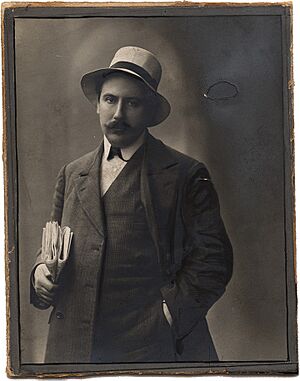Carlo Zangarini facts for kids
Carlo Zangarini (born December 9, 1873 – died July 19, 1943) was an Italian writer. He was known for writing the words for operas, which are called libretti. He was also a poet and a teacher. Carlo Zangarini lived his whole life in Bologna, Italy. He is famous for writing the libretti for important operas like La fanciulla del West by Giacomo Puccini. He also wrote for I gioielli della Madonna and Conchita.
Life and Work
Carlo Zangarini was born in Bologna, Italy. His father was Italian, and his mother was American. This mixed background was helpful for his work.
Writing for Opera
Zangarini became a librettist, someone who writes the story and words for an opera. He worked with famous composers.
- La fanciulla del West: He helped write the libretto for Giacomo Puccini's opera La fanciulla del West (The Girl of the Golden West). This opera is set in the Western United States. It tells a story about a mining camp during the 1849 Gold Rush in California. Zangarini worked on this with another poet, Guelfo Civinini.
- Other Operas: He also wrote the libretti for I gioielli della Madonna (The Jewels of the Madonna) in 1911. This opera was by the composer Ermanno Wolf-Ferrari. In the same year, he wrote Conchita for the composer Riccardo Zandonai.
Translating Operas
Carlo Zangarini also translated operas from French into Italian. This allowed Italian audiences to enjoy these works in their own language. He translated:
- Médée by Luigi Cherubini
- Pelléas et Mélisande by Claude Debussy
Poetry and Teaching
Besides writing for operas, Zangarini was also a poet. The composer Ottorino Respighi even set some of Zangarini's poems to music. These included "Scherzo," "Stornellatrice," and "Invito alla danza."
For the last seven years of his life, from 1934 to 1943, Zangarini was a professor. He taught poetic and dramatic literature at the Conservatorio Giovanni Battista Martini in Bologna. He passed away in Bologna in 1943.
 | May Edward Chinn |
 | Rebecca Cole |
 | Alexa Canady |
 | Dorothy Lavinia Brown |


